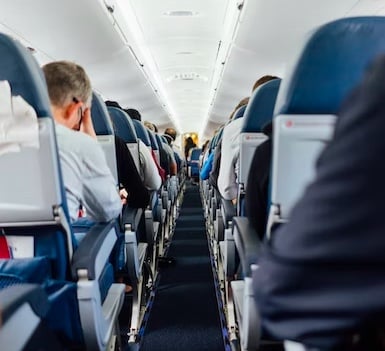Bipartisan members of both the House and Senate proposed a new no-fly list for disorderly airline passengers on Wednesday.
A similar idea was pushed last year by airline unions, but it failed to gain traction on Capitol Hill.
Before the 9/11 terror attacks, there were only 12 people on any No-Fly Lists. After 9/11, the newly formed Transportation Security Administration (TSA) took over aviation security from the Federal Aviation Administration (FAA). Within ten years, there would be approximately 420,000 individuals on the Terrorist Watchlist, with 32,000 of those individuals on either the No-Fly List or the Selectee List; on the latter list individuals must undergo additional security screening before being permitted to board an aircraft.
The new legislation would be separate from the current no-fly list which focuses on preventing people suspected of ties to terrorism from boarding planes. The proposed legislation would allow the TSA to ban people convicted or fined for assaulting or interfering with airline crew members.
According to the FAA, the number of unruly passengers on flights hit a peak in the winter of 2022. Such incidents have since dropped, but the FAA says “there’s more work to do.”
In 2022 there were 2,459 unruly passenger reports, 831 of which led to federal investigations. Of those, 567 sparked “enforcement actions,” including nearly $8.45 million in fines.
“The violent incidents have not stopped,” said Cher Taylor, a Frontier Airlines flight attendant who claims to have witnessed one passenger attack another in 2021 in Miami—only for the attacker to walk away before police arrived.
Just this month, a 33-year-old Massachusetts man, Francisco Severo Torres, was charged with trying to stab a flight attendant and open a plane door mid-flight.
Individual airlines maintain lists of passengers they have banned but have resisted sharing names with other airlines, partly out of fear they could violate laws against cooperation among competing carriers.
The new legislation was introduced by Sen. Jack Reed (D-RI) along with Reps. Eric Swalwell (D-CA) and Brian Fitzpatrick (R-PA).
Civil libertarians are vowing to oppose the measure, asserting that the current no-fly list is not transparent enough and unfairly targets people of color.
“If Congress wants to further reduce air-rage incidents on aircraft, it should look at forcing the airlines to make flying a less miserable experience,” said Jay Stanley, a spokesman for the ACLU.


